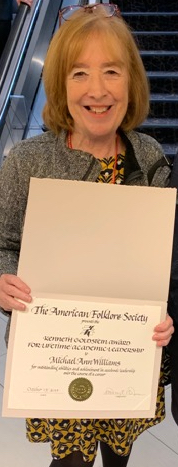Department of Folk Studies and Anthropology News
Dr. Michael Ann Williams, University Distinguished Professor of Folk Studies, Emeritus, Awarded Kenneth Goldstein Award for Lifetime Academic Leadership
- Monday, October 21st, 2019

On Thursday, October 17th, Dr. Michael Ann Williams, WKU University Distinguished Professor of Folk Studies, Emeritus, was awarded the Kenneth Goldstein Award for Lifetime Academic Leadership at the 2019 American Folklore Society Annual Meeting in Baltimore, Maryland.
This award, bestowed biennially by the American Folklore Society, recognizes outstanding abilities and achievement by a living scholar in academic leadership relating to folklore. “Leadership” includes folklore program development, organizational and center development, teaching, and advising.
Dr. Williams has had an illustrious career in every way, from her significant publications and successful public-oriented projects to her leadership roles, including serving as President of the American Folklore Society (2014-15). This award recognizes her unrelenting work to build and strengthen the Folk Studies program at Western Kentucky University. In her 32-year tenure at WKU, Dr. Williams mentored generations of folklorists as she ushered the Folk Studies program through decades of change and growth. In 2004, she led the charge to create the new Department of Folk Studies and Anthropology, and she served as Department Head until her partial retirement in 2017. In 2012, she oversaw the move of the Kentucky Folklife Program, founded in 1989 and formerly an inter-agency of the Kentucky Historical Society and Kentucky Arts Council, to its new home in the Department. She was instrumental in bringing the editorship of the Journal of American Folklore to WKU in 2015 and served as co-editor for two of the five years of its editorship with WKU Folk Studies faculty.
Throughout her career at WKU, Dr. Williams orchestrated numerous public-oriented documentation and preservation projects, contributing both to the prestige of the Folk Studies program and the educational experience and applied training of its students. Such projects include: multiple grants for projects with the National Park Service, including the Great Smoky Mountains National Park and Kentucky’s Mammoth Cave National Park; a 2012 survey of log structures in nearby Allen County; multiple student-led nominations of sites to the National Register of Historic Places; and ongoing restoration work and oral history documentation of the Gardner House (a 19th century brick hall-and-parlor house located on the Upper Green River Biological Preserve). This work, which always engaged students, has also enhanced the reputation of WKU; in 2016, for example, the Folk Studies program was awarded the Edith S. Bingham Award for Excellence in Preservation Education by Preservation Kentucky. She has had a profound impact on graduates of the program who are now among the most successful in this field, while also leaving her mark on the university community and the field as a whole.
Folklore studies at WKU had begun in 1917 when folklorist and professor of English Gordon Wilson began a folklore library, and folklore classes have been taught at WKU since Wilson’s day. A folklore minor was established in 1968 followed by the MA in Folk Studies in 1972. By the time Dr. Williams arrived in 1986, the program had become known as the premiere place for academic training in the burgeoning field of public sector folklore as well as folkloristic approaches to vernacular architecture and historic preservation.
The program is committed to continuing Dr. Williams’ longstanding dedication to providing students with opportunities to engage in the hands-on, applied folklore research and training that prepares them for successful careers in public folklore, historic preservation, and a wide range of other areas.
Some of the links on this page may require additional software to view.

